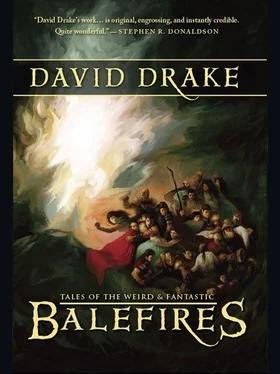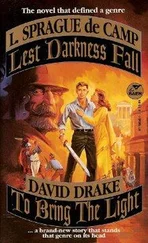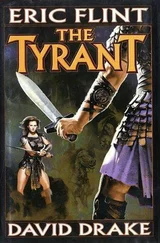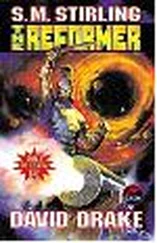David Drake - Balefires
Здесь есть возможность читать онлайн «David Drake - Balefires» весь текст электронной книги совершенно бесплатно (целиком полную версию без сокращений). В некоторых случаях можно слушать аудио, скачать через торрент в формате fb2 и присутствует краткое содержание. Жанр: Фантастика и фэнтези, на английском языке. Описание произведения, (предисловие) а так же отзывы посетителей доступны на портале библиотеки ЛибКат.
- Название:Balefires
- Автор:
- Жанр:
- Год:неизвестен
- ISBN:нет данных
- Рейтинг книги:5 / 5. Голосов: 1
-
Избранное:Добавить в избранное
- Отзывы:
-
Ваша оценка:
- 100
- 1
- 2
- 3
- 4
- 5
Balefires: краткое содержание, описание и аннотация
Предлагаем к чтению аннотацию, описание, краткое содержание или предисловие (зависит от того, что написал сам автор книги «Balefires»). Если вы не нашли необходимую информацию о книге — напишите в комментариях, мы постараемся отыскать её.
Balefires — читать онлайн бесплатно полную книгу (весь текст) целиком
Ниже представлен текст книги, разбитый по страницам. Система сохранения места последней прочитанной страницы, позволяет с удобством читать онлайн бесплатно книгу «Balefires», без необходимости каждый раз заново искать на чём Вы остановились. Поставьте закладку, и сможете в любой момент перейти на страницу, на которой закончили чтение.
Интервал:
Закладка:
David Drake
Balefires
I was born in Dubuque, Iowa, and at age ten moved with my family to Clinton, fifty miles south along the Mississippi River. Outsiders tend to think of Iowa as flat. Much of the state is, but where I come from the bluffs rise straight up out of the river. Dubuque has an operating cable car (funicular railway) that a wealthy banker built to carry him from his office in the floodplain to his home on the bluffs 300 feet above. The view out over the river into Illinois is spectacular.
Others thought so too. All over the area are Amerind grave mounds looking down from the bluffs. One of them's on the farm that belonged to my father-in-law.
My dad was an electrician, but nobody in Iowa is very far from a farm. Family friends had farms when I was a boy; my wife's family were and are dairy farmers. I've spent enough time on and around some of the most productive family farms in the world to have a feeling for the life.
Which is very, very hard. The work has to be done every day, no matter how you feel or what the weather's doing: you can't call in sick and tell the cows that they won't be milked this morning. The machinery is dangerous beyond the imagination of a modern factory worker; the organo-phosphate insecticides were invented just in time for World War II, where they provided the Nazis with the first nerve gases; and even city-dwellers know that if anybody gets rich from agriculture, it isn't the family farmer.
The characters in this story are modeled on real people but they're not my in-laws. The farm is one my in-laws owned, including details like the curio cabinet and the hunting rifle.
I frequently use a story that has greatly impressed me as a model for one of my own. This isn't quite so direct a case as some, but I want to mention the similarities to Theodore Sturgeon's "Killdozer." The title (which was the genesis of the story) comes from Robert Browning's "Childe Roland to the Dark Tower Came."
As he swung the tractor for a final pass across Sac Ridge Field, Deehalter saw that dirt had been turned on the side of the Indian mound. The big man threw in the hand clutch of the Allis-Chalmers and throttled the diesel back to idle as he glared at the new trench through the barbed wire. "That goddam Kernes," he whispered. "If I've got to work with him much longer…"
He revved the engine and slammed the tractor back in gear. The farmer's scowl was as black as the hair curling up his arms from the backs of his hands to the shirtsleeves rolled at his biceps.
At the south end of the field, Deehalter raised the cultivator and drove the Allis down the long, looping trail back to the farm buildings. There was a way of sorts straight west from the top of the ridge, but it was too steep for the tractor. The more gradual slope took Deehalter through half a dozen gates and eventually back to the buildings from the southwest. To the left loomed the barn and the three concrete silos peering over its roof at him. The milking parlor was a one-story addition to the barn's east side, facing the equipment shed and the gas pump. And at the pump was Tom Kernes with his ten-year old son, Deehalter's nephew, putting gas in the jeep.
Deehalter pulled up beside them and let the diesel clatter for a moment before he shut it off. Kernes, a short, ginger-headed man, looked up. His arms were not tan but a deep red, with brighter slashes where the straps of his undershirt had interrupted part of the sunlight. Kernes was thirty-five, five years younger than his brother-in-law, but his crinkly, sunburned face would have passed for any age. "Finish Sac Ridge already, Dee?" he asked in his pleasant, throaty voice. The tension in his muscles showed that he had correctly read Deehalter's anger.
"Kernes, what've you been doing with the Indian mound?" the bigger man demanded from the tractor seat. "You know to leave that the hell alone!" A pick and shovel lay in the back of the jeep. Deehalter noticed them and a black flush moved across his face.
Kernes' skin was too red to show the blood, but his voice rose to the challenge. "When Old John owned the farm, he could say what he pleased; but he's dead now. I'm damned if I'm not going to get an Indian skull like yours." Gesturing eastward at the ridge, the little man added, "I own half this goddam place and I'm going to get a skull."
The curio cabinet in Deehalter's parlor had been assembled by his grandfather before the first world war. Among its agates and arrowheads, sword-cane and ostrich plumes, was a brown human skull. The family had always assumed the skull came from a mound somewhere, but not even Old John had been sure. It fascinated Kernes, perhaps only because Deehalter had refused to give it to him. The main house and its furnishings, including the cabinet, had gone to Deehalter under his father's will-just as the new house in which his sister Alice lived with Kernes and their children had gone to her. The rest of the six-hundred-acre farm was willed to Deehalter and Alice jointly, with the provision that if either of them tried to partition the property, the whole of it went to the other. Deehalter had talked to a lawyer and he was sure Kernes had done the same. The worst news either of the men had heard in a long time was that the will would probably stand up in court.
"There's a law against digging up mounds," Deehalter muttered.
"There's a law against keeping an Indian skull on display," the shorter man blazed back. "You going to bring the law in here, Dee?"
"Well, "Deehalter said lamely, "you don't get everything in the mound. You've no right to that."
Kernes stood, arms akimbo, sweat from the June sun glittering on his face. "If I do all the goddam digging, I do," he said. "And anyhow, I get the skull out first."
Deehalter wiped his face with his huge, calloused palm. He didn't like to fool with the mound. Old John had whaled him within an inch of his life thirty years ago, when he had caught his son poking into the smooth slope with a posthole digger. But Deehalter remembered also the nightmare that had awakened him for months after that afternoon, and that dream was of nothing so common as a beating by his father. Still, to let Kernes take everything…"All right," Deehalter said, "I'll help you dig. But I get my pick of anything besides a skull. Wouldn't be surprised if there was gold in with a chief."Actually, Deehalter knew enough about mounds to doubt there would be anything that would interest a non-archeologist-often the mounds hadn't even been built over a body. But that wasn't anything the big farmer was going to say to his brother-in-law.
"Dad," said the Kernes boy unexpectedly."If Uncle Dee helps you, you don't need me, do you?"
Kernes looked at the child as though he wanted to hit him. "Go on, then," he snapped. "But I want that goddam toolshed painted when I get back. All of it!"
The boy took off running for the house. Wiener, the farm's part-collie, chased after him barking. "Kid's been listening to his mother," Kernes grumbled. "From the way Alice's been carrying on, you'd think Old John was going to come out of his grave if I dug up that mound. He must've knocked that into her head with a maul."
"He was strong on it," Deehalter agreed absently."I know when he was a boy, there was still a couple Sac Indians on the farm. Maybe they talked to him. But he was strong about a lot of things."
"Well, you ready to go?" Kernes demanded. He had hung up the pump nozzle and now remembered to cap the jeep's tank.
Deehalter grimaced."I'll put the cultivator in the shed," he said. "Then we'll go."
Kernes drove, taking the direct trail through the east pasture. There was a rivulet to ford and a pair of gullies that had to be skirted, but the hard going didn't start until they reached the foot of the ridge. They had bought the jeep ten years before from Army surplus, and the sharp grades of the ridge slope made the motor wheeze even in the granny gear. Cedars studded the slope, interspersed with bull thistles whose purple bracts were ready to burst open. There was a final switch-back just before the trail reached the summit. As Kernes hauled the wheel hard to the left, the motor spluttered and died. Deehalter swung out of the jeep and walked the last thirty yards while the smaller man cursed and trod on the starter.
Читать дальшеИнтервал:
Закладка:
Похожие книги на «Balefires»
Представляем Вашему вниманию похожие книги на «Balefires» списком для выбора. Мы отобрали схожую по названию и смыслу литературу в надежде предоставить читателям больше вариантов отыскать новые, интересные, ещё непрочитанные произведения.
Обсуждение, отзывы о книге «Balefires» и просто собственные мнения читателей. Оставьте ваши комментарии, напишите, что Вы думаете о произведении, его смысле или главных героях. Укажите что конкретно понравилось, а что нет, и почему Вы так считаете.











